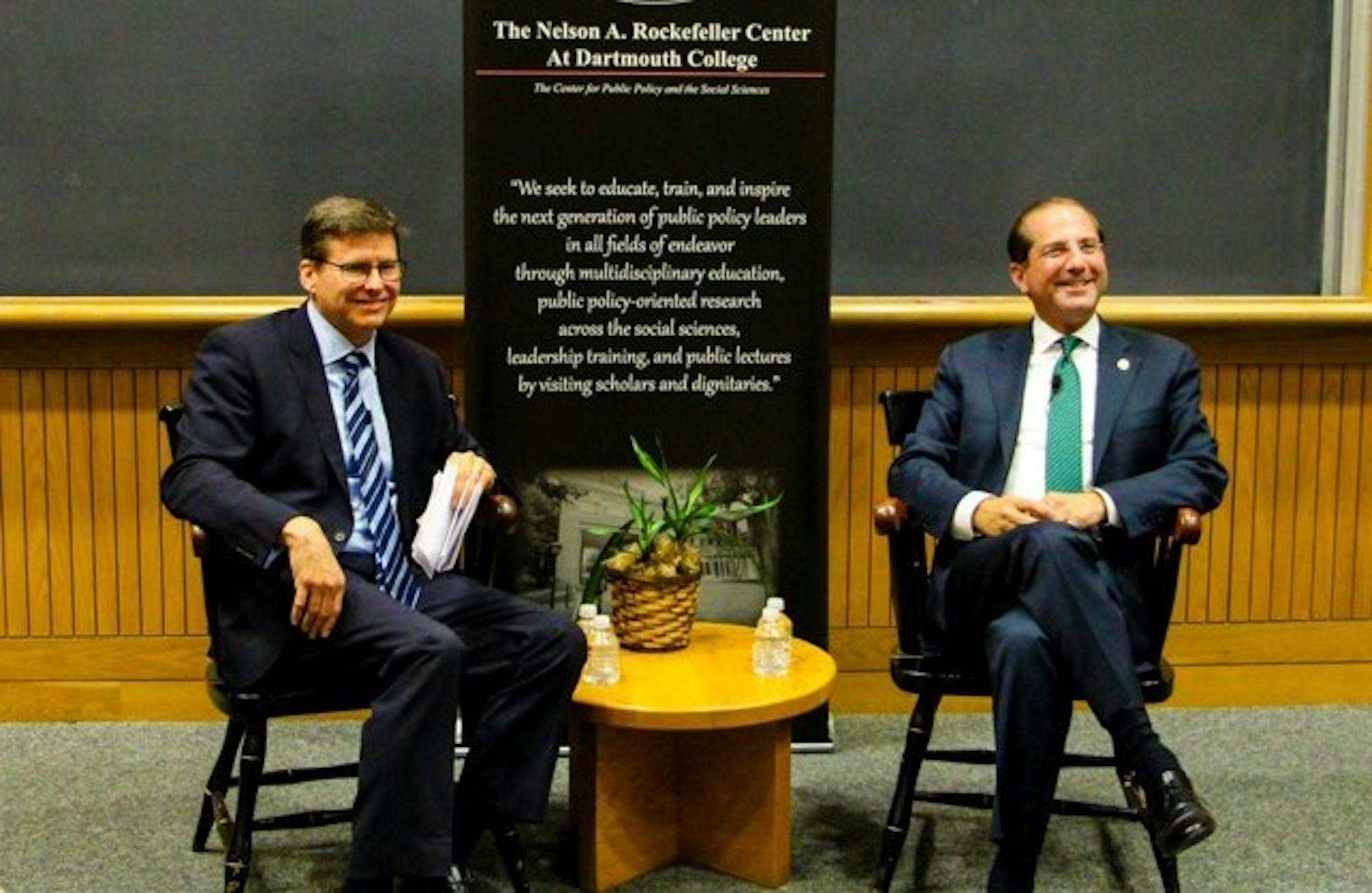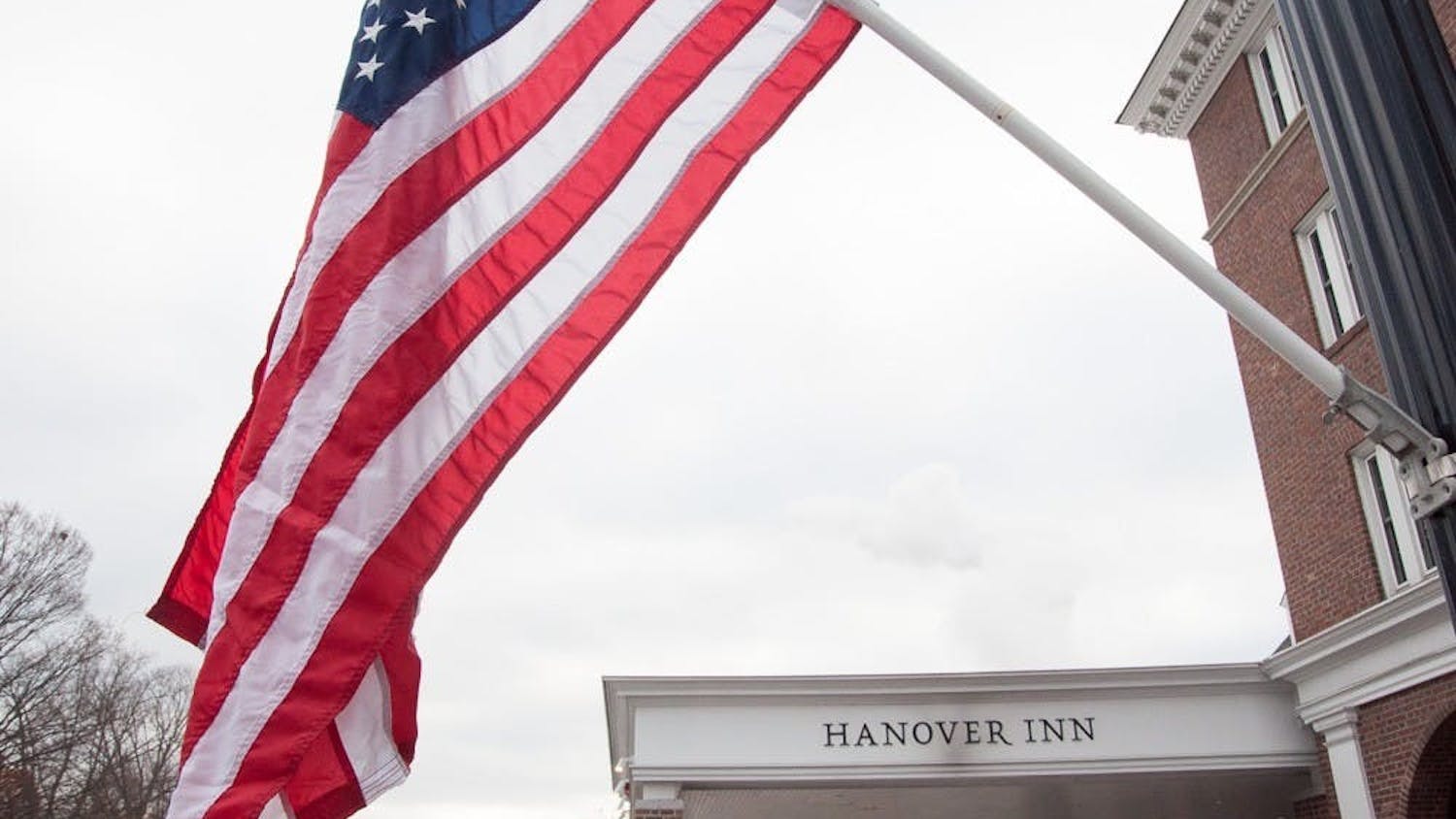U.S. Secretary of Health and Human Services Alex Azar ’88 will leave office on Wednesday to be replaced by California attorney general and President-elect Joe Biden’s appointee Xavier Becerra, pending confirmation by the Senate. Azar — whose resignation is effective at noon on Jan. 20 — leaves office as COVID-19 cases continue to hover at record highs nationwide. His response to the coronavirus pandemic has been widely criticized by health professionals and news outlets.
Azar, nominated by President Donald Trump on Nov. 13, 2017, previously served as general counsel and deputy secretary to HHS during the Bush administration. Azar chaired the White House Coronavirus Task Force from January to February 2020 prior to Vice President Mike Pence. Before serving under the Trump administration, Azar was the former president of the U.S. division of Eli Lilly and Company, a pharmaceutical company.
Harold Swartz, professor of radiology at the Geisel School of Medicine, said that while Azar was in a difficult political position, he could have done more to speak out against the administration.
“I understand the constraints that [Azar] had, and I am disappointed that he didn’t show a little bit more independence than he did,” Swartz said. “Especially in the field of health, where one can draw on various expertise … there has been a tradition of pushing back more. My disappointment is that he didn’t use that potential leverage.”
Azar’s response to the coronavirus pandemic came to largely define his tumultuous tenure under the Trump administration. Azar, alerted to the threat of the novel coronavirus by the Centers for Disease Control director Robert Redfield on Jan. 3, 2020, did not inform the president until two weeks later. On Jan. 20, 2020, in what The Wall Street Journal called an “early misstep,” Azar told Trump that the coronavirus epidemic was under control.
Azar also received backlash for his oversight of flawed COVID-19 test development. Rather than requesting World Health Organization tests, the CDC elected to develop and distribute its own test — a common practice for countries with the necessary research capabilities. Shortly after the tests were shipped to labs around the U.S., the CDC was forced to recall them due to defects — a setback for many who had hoped for the quick rollout of diagnostic testing as a crucial measure to limit disease spread.
Early in the pandemic, The Wall Street Journal reported that Azar was also reluctant to collaborate with the Federal Emergency Management Agency, which coordinates a federal response to disasters that have overwhelmed state and local authorities.
HHS, which also oversees $100 billion in stimulus funding, found itself under further scrutiny when health professionals argued that HHS funds were not distributed fast enough. Similarly, when contacted about potential shortages in personal protective equipment in January, HHS was slow to respond, waiting weeks to begin a proper ramp-up in manufacturing.
On Jan. 31, 2020, Azar announced a public health emergency, and on the same day, restrictions on travel from China.
Swartz noted that Azar remained tightly aligned with Trump, much like the heads of the FDA and CDC, while Anthony Fauci, director of the National Institute of Allergy and Infectious Diseases, took a distinctly apolitical route in his approach.
“We could have saved a lot of lives had the administration been more aggressive in pushing common-sense, reasonable things — particularly masks and social distancing — and I wish he would have done that,” Swartz said.
On Feb. 25, when Nancy Messonnier, director of the National Center for Immunization and Respiratory Diseases, discussed the potential of declaring COVID-19 a pandemic, Azar said at a press briefing that the virus was “contained.” Shortly after, Trump replaced Azar as head of the coronavirus task force with little warning.
After Pence replaced Azar, who continued to serve as HHS Secretary, Azar was absent from press briefings, news conferences and operational check-ins — where key health agencies prepare for task force meetings. The New York Times posited that Azar’s sidelining suggested disagreement and turmoil between administration health officials.
In what the Times called “private chafing,” Trump and his aides blamed Azar after news reports detailing the administration's calamitous response emerged. In late April, Vanity Fair reported that sources familiar with internal White House talks had heard of officials discussing the replacement of Azar as HHS secretary.
Despite the infighting, Azar continued to defend Trump vehemently and repeatedly attributed the nation’s health calamities to external causes such as the WHO and the Chinese government. Azar and the Trump administration condemned the WHO for failing to garner valuable information relevant to the virus and provide an early warning internationally. Azar also criticized the Chinese government for misrepresenting the danger of the virus at its outset.
Throughout the year, Azar defended the administration, claiming in an October CNN interview that their early actions were “aggressive, unprecedented, historic steps for which we were criticized every step of the way for being too aggressive at the time.”
As of Monday, the U.S. has reached 24 million cases and nearly 400,000 deaths related to COVID-19 — the highest levels in the world.
Public policy professor Charles Wheelan ’88, who graduated from Dartmouth the same year as Azar, said that while the U.S. response to COVID-19 has been “bungled,” it is hard to know who within the administration is directly responsible.
Among the other health priorities that Azar identified were curbing opioid overdose-related deaths, working to end the HIV epidemic and reducing electronic cigarette use among youth, according to the HHS website. Wheelan said that when Azar made a visit to campus in May 2019, Azar discussed many of these policies, which Wheelan said went largely unrealized.
“As far as I can tell, there was no progress in that regard during the Trump administration,” Wheelan said. “There was no systemic change to the system, which we need.”
Wheelan added that despite some of Azar’s missteps, he felt that the secretary received a lot of unfair backlash for his ties to the pharmaceutical industry. He noted that the critique has now disappeared as the industry has developed vaccines in record time.
Some alumni have also expressed disappointment with Azar’s performance as HHS Secretary. Guillermo Rojas Hernandez ’13 started a petition to revoke Azar’s Dartmouth diploma in light of the riots at the Capitol protests on Jan. 6. In his resignation letter, Azar wrote that “the attacks on the Capitol were an assault on our democracy and on the tradition of peaceful transitions of power that the United States of America first brought to the world.”
“Now that there has been an attempted coup, he is still not doing his job,” Rojas Hernandez said. “I think it is time to take a stand.” The petition, which has 31 signatures as of press time, specifically notes Azar’s refusal to answer questions related to the potential use of the 25th Amendment to remove Trump from office.
Rojas Hernandez noted that in his view, Azar too often allowed his allegiance to Trump to supersede the interests of the nation.
“I have been looking at the way he has administered the response to the pandemic, and I believe he has been ineffective as Secretary of Health and Human Services,” Rojas Hernandez said. “If he had done his administrative job correctly, we wouldn’t have 400,000 deaths.”
Rojas Hernandez said that by allowing Azar to continue his career without condemnation, the College is “enabling people like him.”
Azar and the Office of the Secretary of Health and Human Services did not respond to requests for comment.
Correction appended (Jan. 20, 2021): A previous version of this article indicated that the U.S. declined WHO COVID-19 tests. The article has been updated to reflect that the U.S. chose not to request WHO tests, and the CDC produced its own instead. It has also been updated to clarify that it is not standard for countries with strong research capabilities to request tests from the WHO.





